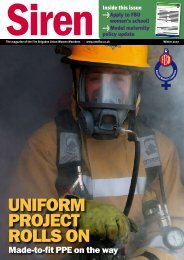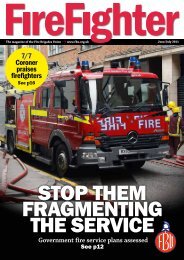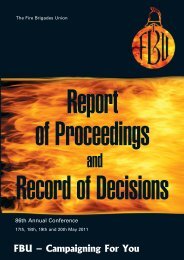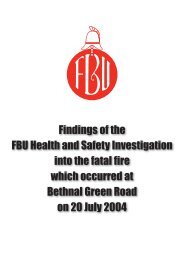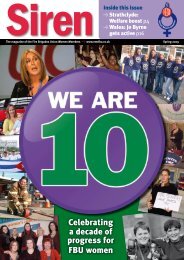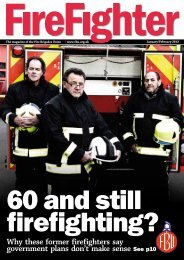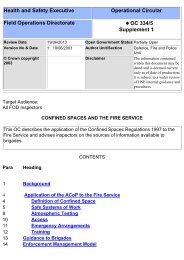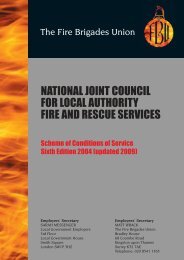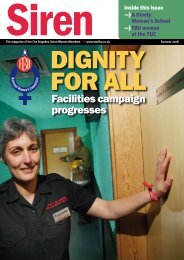Report - Fire Brigades Union
Report - Fire Brigades Union
Report - Fire Brigades Union
You also want an ePaper? Increase the reach of your titles
YUMPU automatically turns print PDFs into web optimized ePapers that Google loves.
SECTION B — FIRE AND RESCUE SERVICE POLICY<br />
This is not a new conclusion, but the challenge for local<br />
leaders and for the sector collectively is to deliver the<br />
efficiencies available in this area consistently at their own<br />
initiative.<br />
The other big area of spend is in functions in place to<br />
support front line service delivery. These include functions<br />
such as development of operational policy, health and<br />
safety teams, senior managers on flexi duty systems, risk<br />
teams, HR, finance, IT, democratic services and training.<br />
Due to the current structure of the Service in England it is<br />
generally accepted that resources are not used as<br />
efficiently as they might be and there is significant<br />
duplication of effort. Collaboration between Services is<br />
fairly limited and since the de-nationalisation of the <strong>Fire</strong><br />
Service in 1947 there has only been one voluntary<br />
combination, Devon and Somerset. This lack of change has<br />
resulted in many functions that might be done better<br />
collectively, continuing to be undertaken within each FRA.<br />
Full combination is not the only answer to a better use of<br />
FRS resources. Full scale, structured collaboration can drive<br />
out much of the duplication that exists currently, whilst<br />
maintaining local identity and democratic control. This is an<br />
approach which has been adopted successfully elsewhere<br />
in local government and is gaining in popularity. There are a<br />
range of activities that should be examined by individual<br />
FRAs with neighbouring authorities in considering scope<br />
for local savings:<br />
● Streamlining management teams – this would include<br />
CFO/CE and principal managers;<br />
● Training, this would include all aspects of operational<br />
training, trainers and training managers;<br />
● Health and Safety services;<br />
● Fleet services including workshops;<br />
● Operational officer rotas;<br />
● Operational planning/risk teams;<br />
● Media/Communications;<br />
● Special appliances, eg Command Units, Water Carriers<br />
and Operational Support vehicles;<br />
● Logistical support and resource management;<br />
● Control room (dependent on future of Regional Control<br />
Project);<br />
● <strong>Fire</strong> Investigation;<br />
● Arson Task Force and dog handlers;<br />
● <strong>Fire</strong> Safety enforcement;<br />
● Community Safety teams;<br />
● Hydrant inspection.<br />
The above list consists of generally FRS-specific functions.<br />
Other support functions such as finance, HR and IT could<br />
also be shared or sourced externally. Some Services<br />
already do this, particularly those part of County Councils.<br />
The list above is not exhaustive, and the sector should<br />
consider collectively the scope for larger scale savings<br />
through joint action at a spatial level above the local. This is<br />
discussed further under “Alternative Models” below.<br />
There is both a broad consensus and clear evidence that<br />
collective delivery of services and support functions will<br />
deliver savings. Many FRAs have been planning or actively<br />
exploring options for closer integration within the FRS<br />
sector, across the wider emergency services sector, and<br />
with other parts of both the public and private sector<br />
anticipating the need for savings to be delivered.<br />
Government must encourage and enable FRAs to take<br />
forward these opportunities for cost saving through<br />
integration or merger or enabling the FRS to take on new<br />
roles as a commissioned body. Key to this is removing<br />
legislative or other barriers and broadening the powers of<br />
competence available to FRAs as proposed elsewhere in<br />
<strong>Fire</strong> Futures. Government should review these with the<br />
sector to ensure all potential barriers or obstacles to local<br />
solutions are removed.<br />
3. EARLY ACTION FOR THE FRS SECTOR<br />
There are many examples of good practice across FRAs in<br />
England and the Service should continue to share these<br />
and actively promote their uptake. Part of developing this<br />
further must be greater accuracy and commonality in<br />
costing. This allows better comparison with private sector<br />
options (something the Service as a whole has been<br />
cautious in exploring.) This should be a first step in the<br />
Service developing a robust model for benchmarking of<br />
costs and outcomes which can be used within a peer<br />
review process, built upon the peer methodology already<br />
used in the area of operational performance. This peer<br />
review model should also offer challenge in the area of<br />
adoption of the leaner staffing models which are already<br />
tested within the Service. Effective VFM peer review<br />
models are already in use in other local government service<br />
areas and the FRS should borrow from the best of these<br />
rather than re-inventing the wheel. The LG Group<br />
Productivity Programme provides a ready made means to<br />
take this forward.<br />
4. LG GROUP PRODUCTIVITY PROGRAMME<br />
The LG Group Productivity Programme is addressing many<br />
of the areas covered in this section of <strong>Fire</strong> Futures and the<br />
FRS should fully engage with the Programme. The<br />
programme has nine workstreams and with the exception<br />
of the two on adult social care and children’s services, all<br />
have resonance for FRAs. Key workstreams are:<br />
● Procurement, capital and shared assets;<br />
● Shared services across areas, tiers and partnerships;<br />
● Data and transparency;<br />
● Shaping markets and new models for service delivery;<br />
● Democratic leadership;<br />
● Workforce and skills;<br />
● Tackling central government barriers and burdens.<br />
Learning from other parts of local government and sharing<br />
good practice from the FRS as part of this programme will<br />
help drive better value for money and drive down costs, as<br />
well as supporting harmonisation in approach with other<br />
local public services.<br />
5. BALANCE OF RESOURCES<br />
VFM in the funding of the FRS is essentially about making<br />
sure existing capacity costs are reduced whilst making<br />
more effective use of that capacity. The FRS is almost<br />
unique within the public sector in being resourced on risk<br />
44 FBU Annual <strong>Report</strong> 2011





